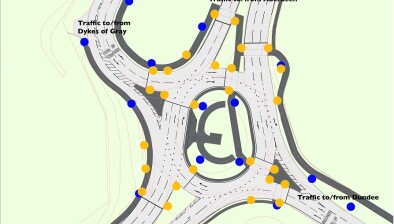Man’s bid to claim five-figure sum in relation to council house purchase rejected

A Dundee sheriff has granted decree of absolvitor to the former partner of a man who sought a five-figure sum from her on the basis that he had given it to her to allow her grandmother to buy her council house, in which he had expected to eventually live with her.
Pursuer Richard Gourlay claimed he had only given the money to defender Lorna Clark to fund the purchase of her grandmother’s house in contemplation of marriage. The defender denied that the pursuer funded the purchase of the property and characterised the pursuer as a serial and vexatious litigant, who had a history of trying to lay claim to other people’s property.
The case was heard by Sheriff Jillian Martin-Brown. The pursuer appeared as a party litigant and the defender was represented by Forsyth, solicitor.
‘Caught bonnie’
The parties were in an on-off relationship from around 2003 to 2014. In February 2013, the defender’s grandmother, Mrs Nancy Allan, exercised her right to buy a property in Brechin from Angus Council. Mrs Allan granted a standard security over the property in favour of the defender’s mother, Mrs Margaret Crawford. A month prior, the pursuer had withdrawn a large cash sum from his bank account, having been paid a sum greater than the purchase price of the property by his pension provider on 15 January 2013, which he alleged he had been asked to provide by the defender.
Evidence was given by Mrs Allan’s solicitor, Stewart Sheddon, who described receiving the funds for the purchase in the form of two cheques drawn from Mrs Crawford’s bank account, and by Mrs Crawford, who described the parties’ relationship as “toxic” and abusive. The defender denied devising a plan with the pursuer for him to fund the purchase and submitted that he had failed to prove his case given the only evidence he had was his own word.
In his evidence, the pursuer asserted that he had offered to draw down his pension to enable the purchase on the basis that the defender would eventually inherit the property, which would provide financial security for them as a couple in their retirement. He denied assertions from the defender and her family that he had subjected the defender to emotional, physical, and financial abuse for years and that this case was a way to continue to exercise control over them.
In cross-examination, the pursuer conceded that he had no paper evidence of any agreement, and that this was the third court case in which he had been involved attempting to recover money paid to another person to fund the purchase of property. The defender submitted that he could not be trusted over Mrs Allan’s solicitor in light of his chaotic financial history, including a bankruptcy, and that he had been “caught bonnie” in Dundonian terms.
No involvement
In her decision, Sheriff Martin-Brown said of the pursuer’s evidence: “I did not find Mr Gourlay to be a credible or reliable witness. During examination- in-chief, he provided a lot of detail about irrelevant matters but not much detail about the facts and circumstances of him allegedly providing cash to the defender. In cross-examination, he was evasive and again talked about irrelevant matters.”
She continued: “Some of his answers in cross-examination, when pressed, were different to what he had said in examination-in-chief. I did not accept as plausible his position that he was willing, for the third time, to provide funds to another person to fund the purchase of a property without any paper trail, let alone a security, given his two previous unsuccessful court actions.”
Having rejected the pursuer’s evidence as unreliable, the sheriff said: “In order to succeed, the pursuer required to prove that he funded the purchase of the property as set out in the pleadings. Having found the pursuer not to be a credible or reliable witness, I was left with the evidence of the defender, Margaret Crawford [and] Stewart Sheddon. Though some of that evidence was of limited weight due to the manner in which it was given, none of that evidence supported the pursuer’s version of events.”
She concluded: “On the contrary, all of the evidence which I accepted as credible and reliable pointed to the pursuer having no involvement in the purchase of the property in Brechin. Consequently, I was not satisfied that the pursuer had proved on the balance of probabilities that he funded the purchase of the property.”
Decree of absolvitor was therefore pronounced in favour of the defender, together with expenses.








